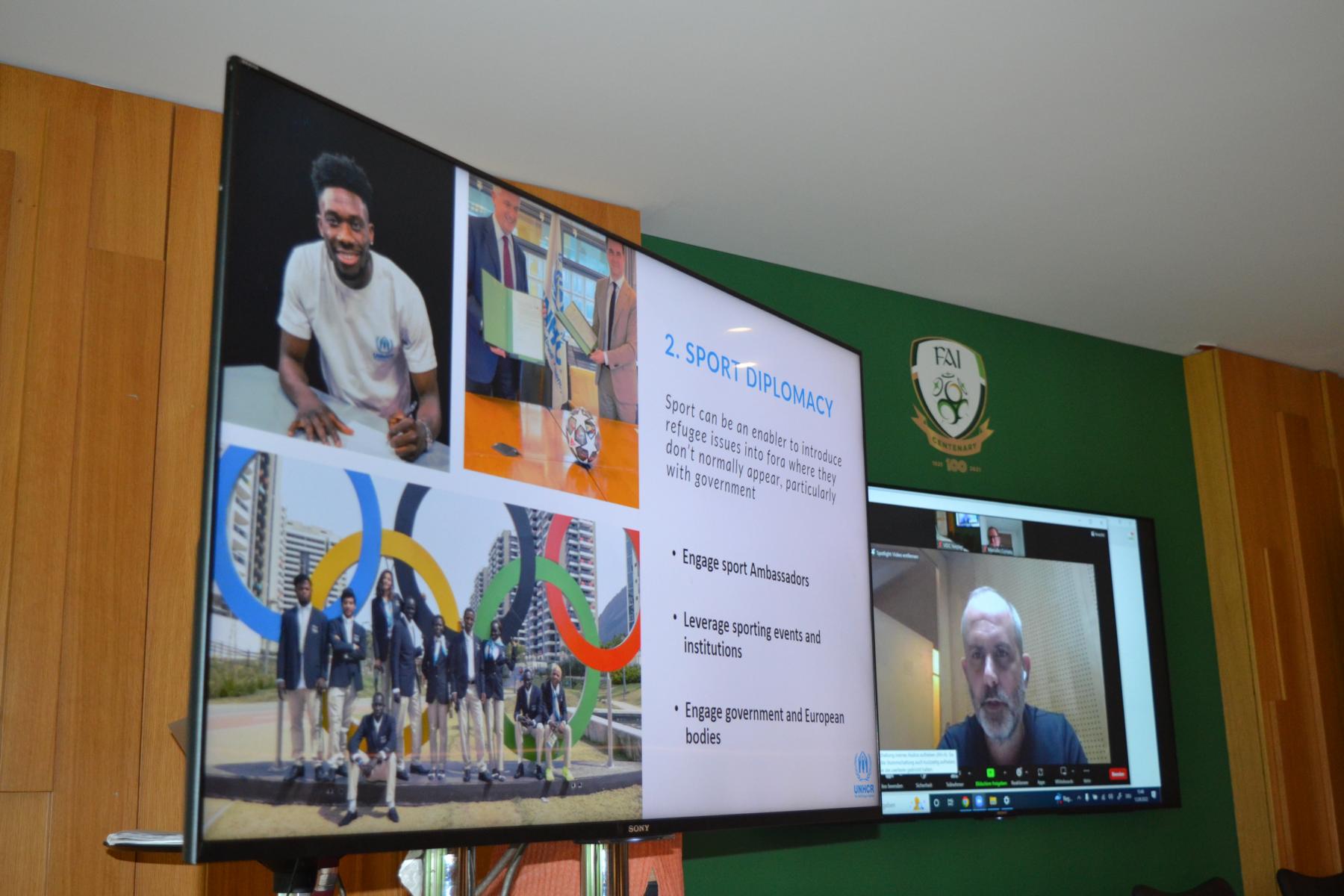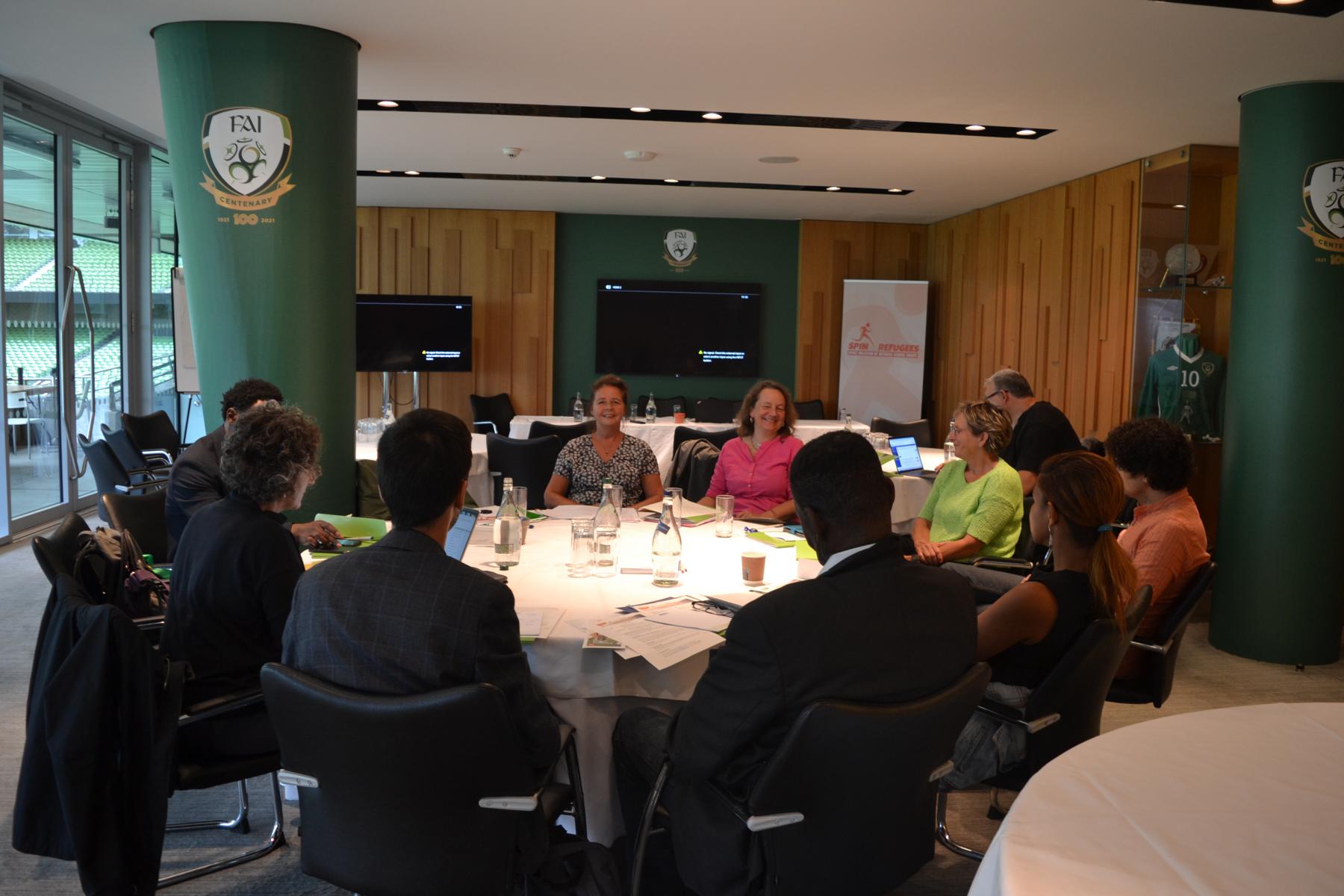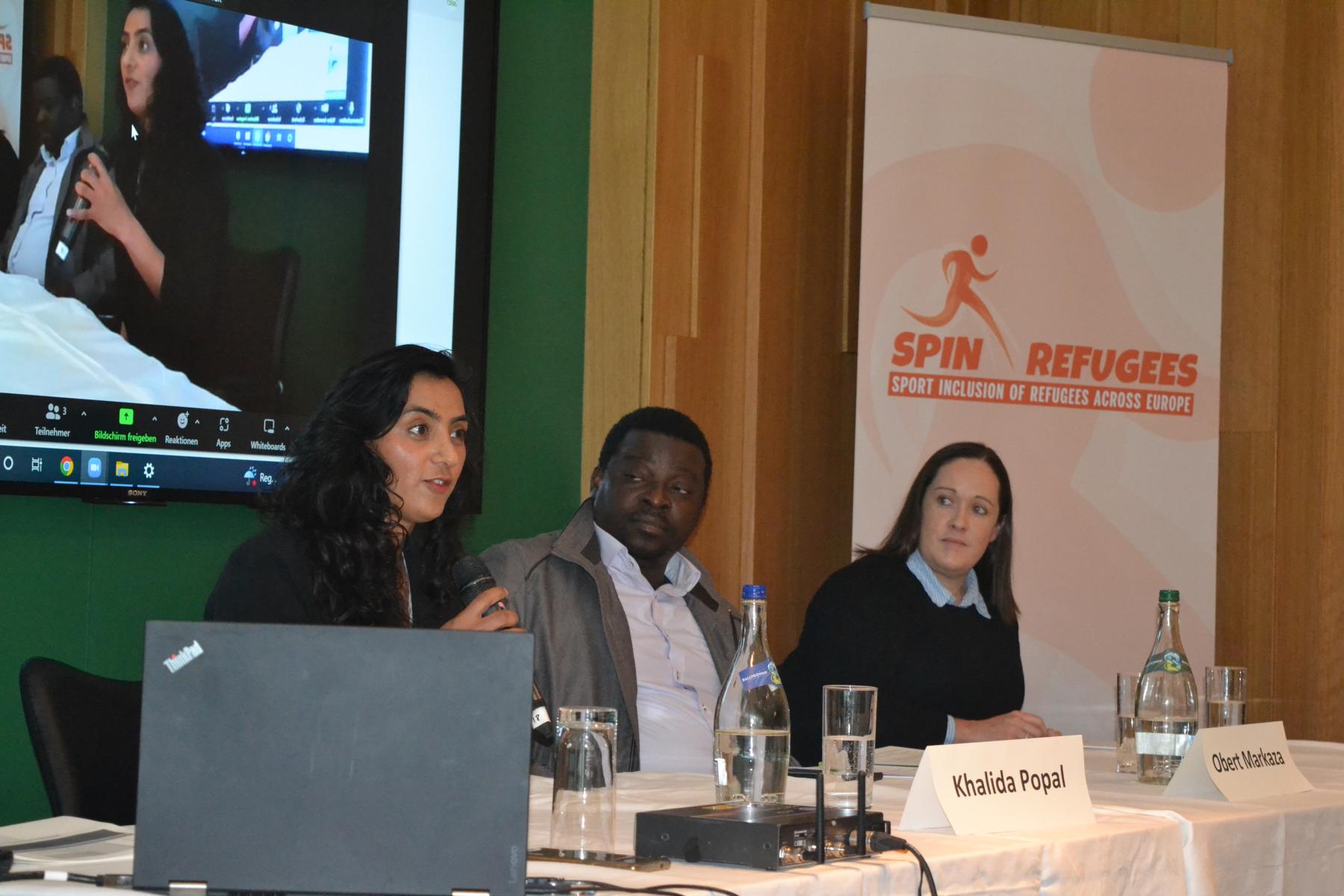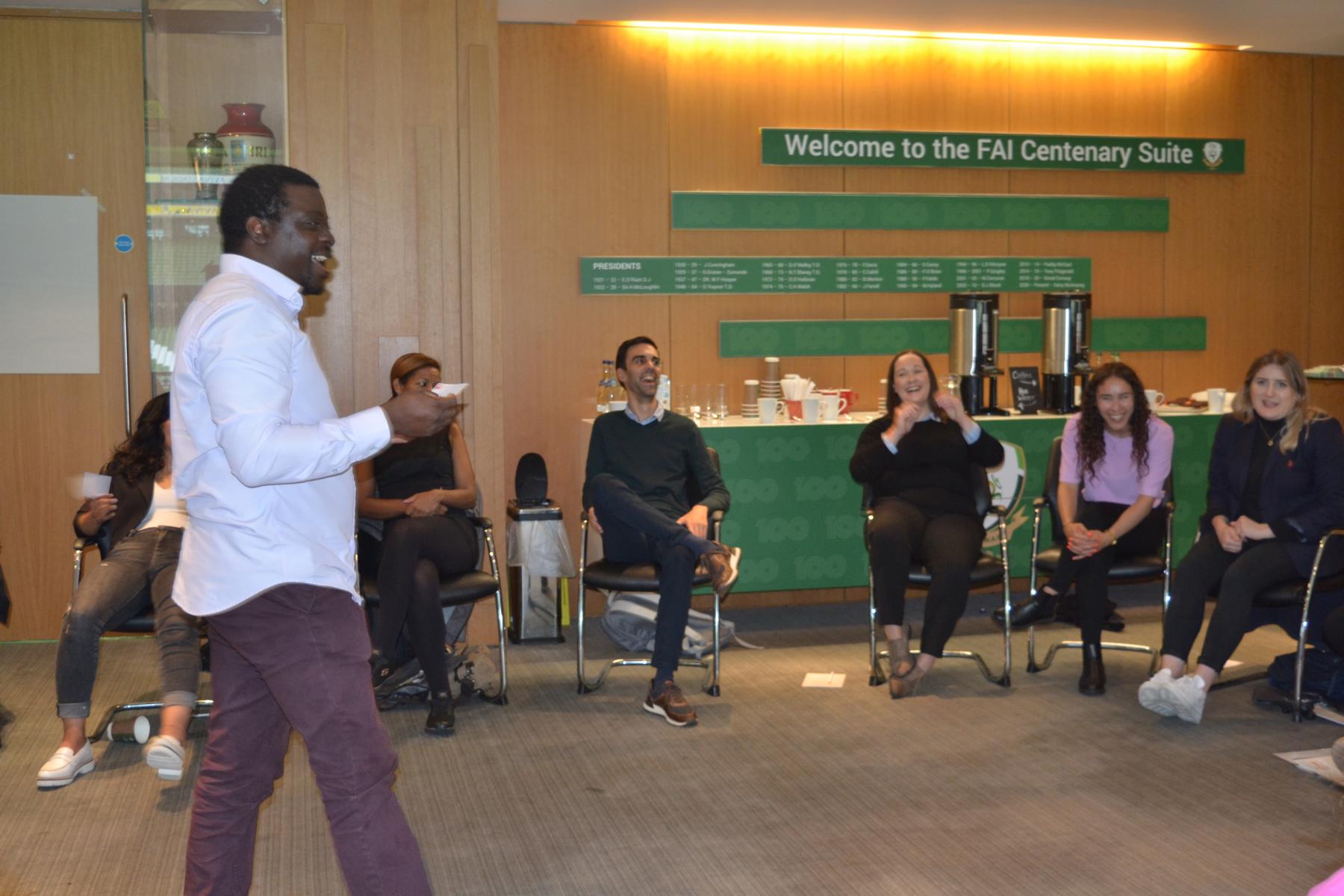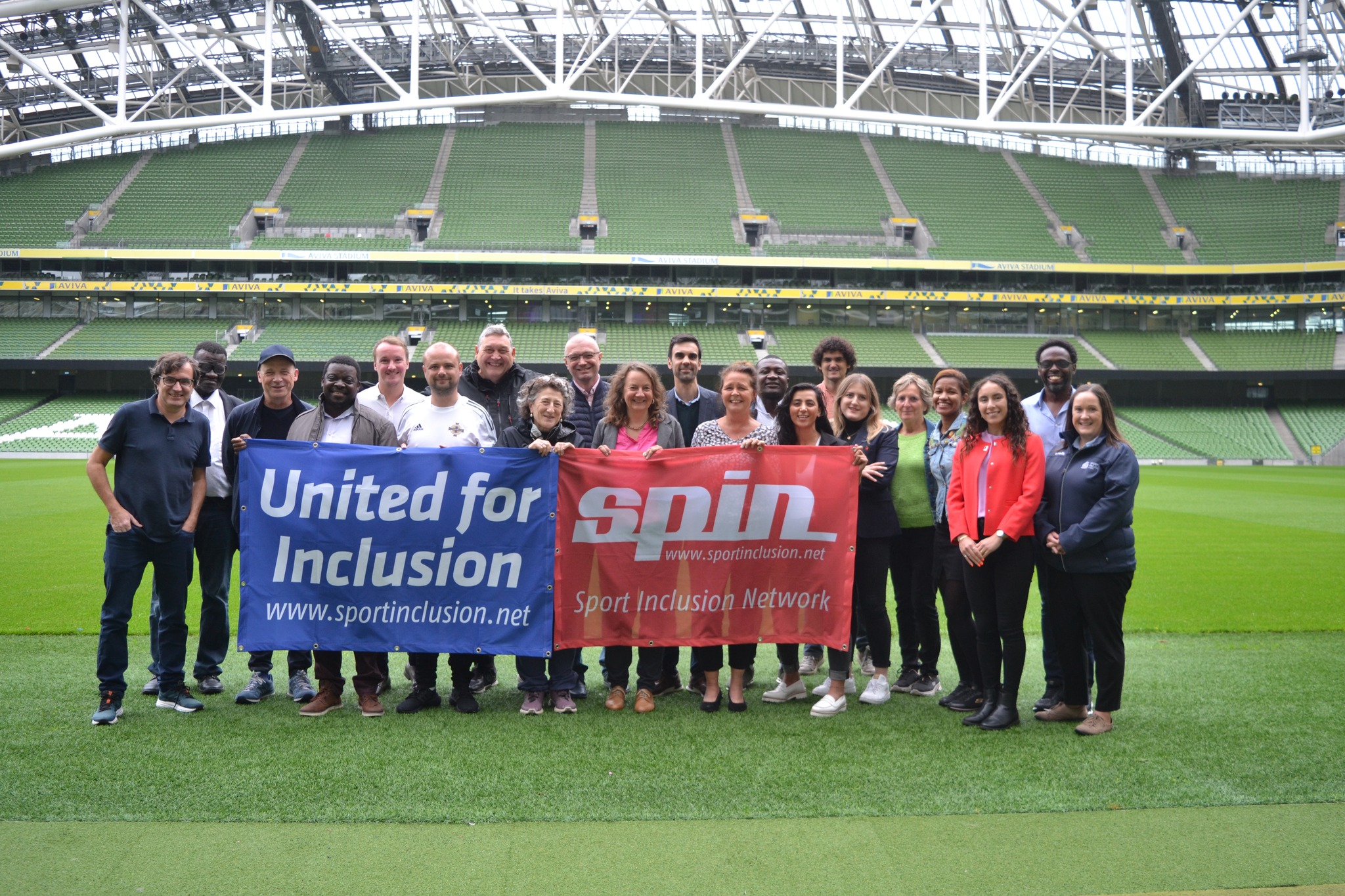
During the 2-day workshop in Dublin, Ireland, hosted by the Football Association of Ireland (FAI) and the Sport Inclusion Network (SPIN), project partners and stakeholders from across Europe discussed strategies and challenges of social inclusion of refugees and asylum seekers through football.
Against the backdrop of the ongoing war in Ukraine and an ever-increasing need to bridge the gap between refugees and their host communities, participants gathered from 12-13 September 2022 at Aviva Stadium in Dublin to discuss the role of football and to share good practices.
The meeting was opened by Des Tomlinson, National Coordinator of the Intercultural Football Programme at FAI, welcoming representatives of the SPIN Refugees project, of participating Football Associations from Poland, Romania – two countries receiving some of the largest numbers of people from Ukraine fleeing the war – Scotland and Northern Ireland as well as experts from the field of football and social responsibility, NGOs and researchers. Kurt Wachter, Head of fairplay–VIDC and SPIN Coordinator, followed by introducing the SPIN Refugees project and outlined the agenda of the two workshop days.
Responding to new challenges
The first panel gathered senior level experts from the European Commission and UNHCR as well as grassroots activists. Considering both the global context and recent transformations in Europe with regards to the influx of refugees, they responded to the new challenges that refugees and host countries are facing.
Nick Sore, Senior Refugee Sports Coordinator at UNHCR, set the scene by providing the latest global statistical insights. Last decade the number of displaced people around the world has doubled, today 1 out of 78 citizens of the world is a refugees. The UNHCR calls for a systematic approach to advance the cause of social inclusion of refugees and deliver on partnerships, policies, and outcomes: 1. Engage the broader eco-system, 2. Sports Diplomacy, 3. Communicate, 4. Mobilize Resources, and 5. Sport-based Programming (see slides for details). Nick Sore said that UNHCR is trying to learn how the sport eco system engages with other agents such as humanitarian and development actors. He urged, “use sports as a diplomatic tool. Sport has the ability to reach audiences and creates areas of engagement with refugees’ communities”.
Pier Marcello Corrado, Sport Policy Officer at the European Commission, reminded the audience that the common goal is to seek a “sport for all”. With the Erasmus+ programme, Corrado emphasized, the European Union has an invaluable tool to build capacity and competence in sport clubs dealing with the ongoing challenges.
Participants also heard from Khalida Popal, former captain of the Afghan Women’s National Football Team and founder of Girl Power Organization, an NGO based in Denmark whose mission is to empower girls and young women from all social and cultural backgrounds, a vision exemplified by Khalida’s own story: “Football and sports had played a great role in my life. It helped me to gain self-confidence and get inspired and empowered, to be united with other women and to stand up for our rights in Afghanistan. I would like to transfer this power and inspiration to Denmark where I live now. Sport has helped to find a common ground among the different communities we are living in.”
Obert Markaza, Direct Provision Support Worker at The Bridge Project, shared his experience from the field of refugee inclusion through his ongoing work in the Irish city of Galway. “It is important to create a platform or environment to facilitate dialogue and engagement. If your voice is not up, you’re not heard, and nobody will do it for you. When your voice is heard, change can happen.”
Helen McHugh, Diversity, Inclusion, and Safeguard Manager at Sport Ireland, provided insights into the Irish context of sport inclusion and the work that is being done more broadly in Ireland as a whole.
In the discussion Khalida Popal criticized the double standards of treating Afghan and Ukrainian refugees: “Is this because of our colour, because we come from a different region, what is our fault? Isn’t it that humans are attacked, no matter their colour?”.
Football as an agent of inclusion: Current Needs and Good Practices
For the final part of Day 1, the workshop shifted to an interactive session, facilitated by fellow SPIN member Willie Westerhof (Huis voor Beweging) and FAI Grassroots Coach Chinazo John Nnaya. Victoria Schwenzer (Researcher at Camino) and Obert Markaza (The Bridge Project) provided inputs around quality criteria and good practices of inclusive participation.
By reflecting on their own respective backgrounds, experiences, and work areas, participants dived deeper into the manifold opportunities that sport and football on a local level can create for the newly arrived. Raising the awareness on club level is often a good starting point, one that the SPIN Refugees project has responded to by creating the Electronic Learning Environment (to be published shortly) that assists both participants as well as coaches/club officials in responding to a more diverse target group.
Networking, New Alliances and Policy Change
Another interactive format opened Day 2 of the workshop: The “Marketplace of Ideas” gave participants an opportunity to present in an open and flash format innovative projects and initiatives to foster inclusion and equal participation of refugees on a club or association level. Several inspiring examples including the input of Florin Sari, the Public Policy & Sustainability Manager of the Romanian Football Federation were shared, leaving group members with food for thought on future activities.
The second and final panel of the SPIN Refugees Workshop aimed at drawing up sporting and societal solutions around the various themes of refugee inclusion. Panelists Joao Oliveira of the Portuguese Players Union SJPF, Saska Benedicic-Tomat of the Integration of Refugees Through Sport Platform (managed by the International Sport and Cultural Association, ISCA), Raffaella Chiodo-Karpinsky (Unione Italiana Sport per Tutti, UISP), all three SPIN members, Perry Ogden, CEO of Sport Against Racism Ireland (SARI), and Khalida Popal (Girl Power Organization) agreed that there is substantial potential and initiative on a local level already. The key to fully leveraging the potential is continued networking efforts and the exchange of best practices, for which the gathering in Dublin provided ample opportunity.
Conclusions: Towards ownership and equal right to asylum
A recuring theme of the workshop has been the need to move away from and paternalistic approach towards refugees. In fact, integration through donors or sport organizations is not enough but persons with a refugee history need to fully participate and have ownership over projects and programmes. Obviously, human beings who escape from war and prosecution need emergency support, but there is also a necessity for a long-term strategy. This will ensure the inclusion of (former) refugees on all levels of sport, including coaching, refereeing and management. The empowerment of grass-roots stakeholders is key in such a strategy,
Looking at the case of Ukraine, we can expect that many will return after the war ends, but – like Yugoslavia in the 1990s – many will remain in the EU. Another theme which evolved at the event has been the double standards in treating refugees. The same governments which became more and more hostile towards receiving refugees from Syria, Afghanistan and Africa are now willing to welcome refugees from Ukraine wholeheartedly. “We don’t see the same equality in viewing refugees. Ukrainians are perceived as more equal, than others, but we need an equal footing to access the right to asylum”, said Nick Sore from UNHCR. Nick Sore reminded the participants that sport has a huge ability to influence and to give refugees a voice.
Different stakeholders such as the EU, UEFA and sport networks such as the EFDN, IRTS or SPIN have to come together to mobilize resources and expertise to support refugees.
Stay tuned for more activities from the Sport Inclusion Network.
DOWNLOADS:
